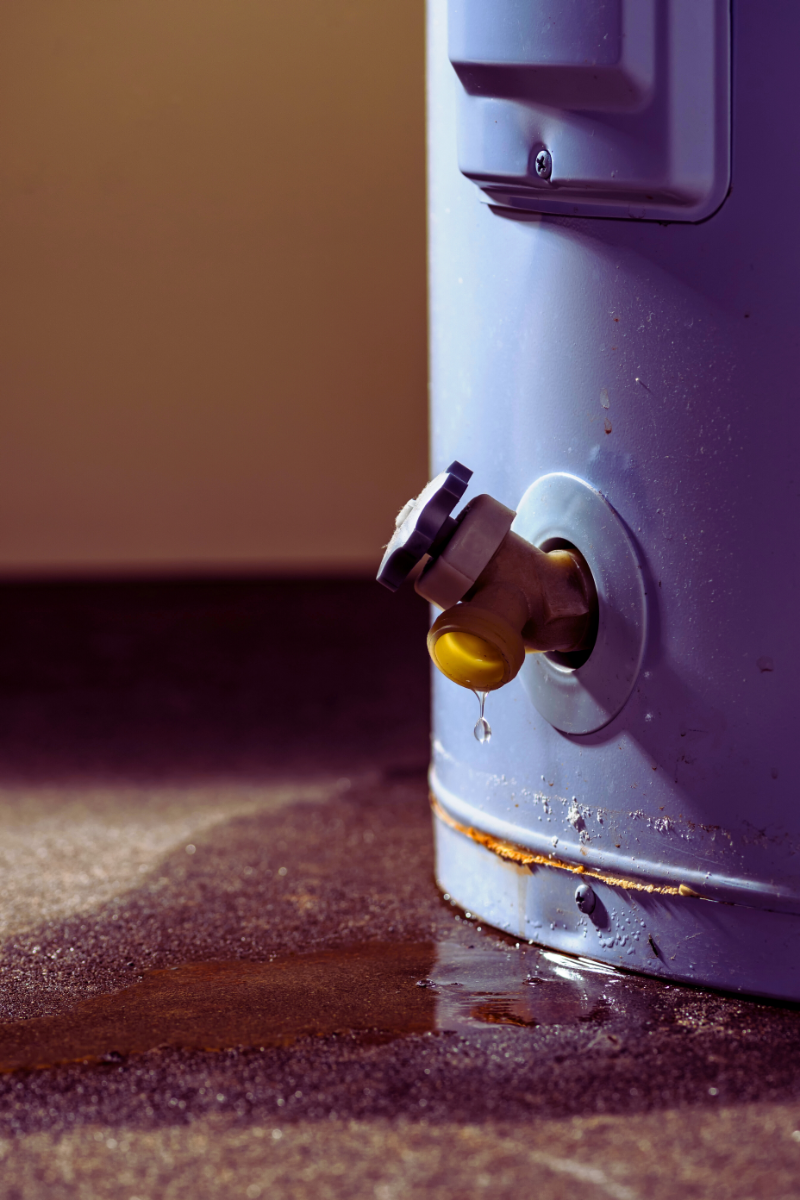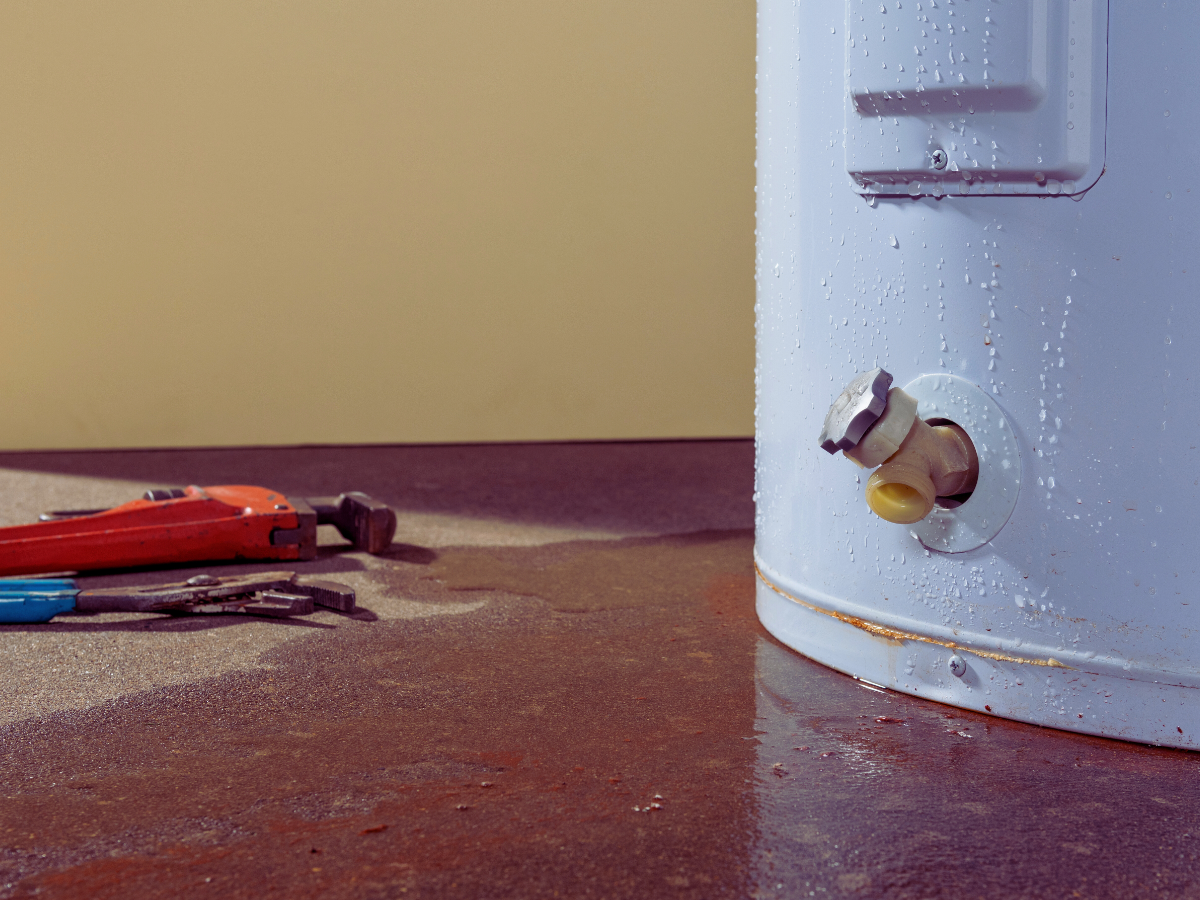 If your water heater has started leaking, figuring out what to do next is very important. Many homeowners make the mistake of thinking they can ignore a leak as long as it’s just a few drops.
If your water heater has started leaking, figuring out what to do next is very important. Many homeowners make the mistake of thinking they can ignore a leak as long as it’s just a few drops.
However, others panic at the first sign of moisture. Which attitude is actually correct?
Keep reading our guide to see whether or not water heater leaks are dangerous.
Key Takeaways
- Water heater leaks can be caused by minor issues like a loose valve or major issues like a corroded tank.
- In most cases, the main risk of a leaky water heater is all the flood damage your house might face, but there are other dangers as well.
- To protect yourself and your home, you need to call a professional as soon as possible.
Common Causes of Water Heater Leaks
To understand the dangers of a leaking water heater, it’s helpful to first take a look at the causes of leaks.
Faulty Temperature & Pressure Relief Valve (T&P Valve)
This valve is often near the top of your tank, and it can wear out over time. If your T&P valve breaks down, you can have a variety of leaking styles. Some may just drip water while others might shoot a high-pressure jet out of the tank.
Loose Plumbing Connections
If one of your water connections is a little loose, it’s very easy for pressurized water to start leaking out of them. You can also run into issues if your plumbing connections are very old because some types of older plastic cables degrade over time.
Internal Tank Corrosion
Certain minerals in your water can react with your tank materials and create corrosive buildup. This buildup eats away at your tank over time and gradually wears a hole in it. When the corrosion finally becomes apparent, you can have a huge hole develop in the side of your tank suddenly.
Drain Valve Issues
The drain valve is a small valve at the base of a water heater that makes it easier to drain when performing tank maintenance. Unfortunately, this valve is a point of weakness in many water heaters. Especially if it’s made of plastic, it’s easy for it to wear out over time. When this happens, a leak will develop.
Why a Leaking Water Heater Is Dangerous
 Once your water heater starts leaking, things can get very messy and dangerous very quickly. Here are some common issues to be aware of.
Once your water heater starts leaking, things can get very messy and dangerous very quickly. Here are some common issues to be aware of.
Water Damage to Floors, Walls, and Belongings
If you have something like a corroded tank, you can end up with 40 gallons of water being dumped into your home quickly. This can soak and destroy things like electronics, furniture, and precious keepsakes. Meanwhile, smaller leaks like a loose plumbing connection can cause issues by increasing humidity and causing mold growth.
Risk of Electrical Hazards
Water is a great conductor of electricity, so if it gets where it’s not supposed to be, hazards can develop. Unfortunately, there have been many incidents of people going to check on a suspected leak and then getting shocked. Leaks can also cause your electrical system to short which may start fires on your property.
Risk of Explosion
When your T&P Valve is malfunctioning, it’s possible for pressure to build up inside your tank. Though rare, this situation can lead to a very dangerous explosion. You also face some explosion risks if you have a gas water heater. A leak can lead to electrical faults that end up igniting gas lines and causing major damage.
Slip-and-Fall Hazards
Don’t underestimate the power of water alone. A puddle suddenly appearing in your hallway or closet is quite risky. Many homeowners have slipped and fallen due to unexpected moisture from a leaking tank.
What to Do If Your Water Heater Is Leaking
With all these issues to be concerned about, you can probably see why it’s so important to act fast during a leak. Here are some safety tips that will help protect you if your tank starts to leak.
Turn Off Power/Gas Supply
Before you begin examining your water heater, make sure to turn off the power supply. You can do this by turning the gas knob or by flipping the breaker that goes to the water heater. This protects from shocks or gas leaks.
Shut Off the Cold Water Supply
Next, stop the flow of water to the tank, so you limit the amount of water damage you face. Most tanks have a water shut-off valve on either the top or the side. If you can’t find it, you can also shut off the main water supply to your house while you figure it out.
Drain the Tank if Necessary
You may want to connect a hose to the drain valve and drain the tank. Going ahead and controlling where the tank drains will reduce the amount of random puddles you get around the tank.
Call a Licensed Technician
Keep in mind that most issues with a leaky tank aren’t something you can fix by yourself. Attempting a DIY resolution can just lead to more leaks and bigger problems in the future. To solve your leaky tank issue, it’s best to call a licensed plumber as soon as possible.
Trust Benjamin Franklin Fort Myers for Water Heater Repairs
 Ultimately, a broken water heater can lead to problems, but it doesn’t have to be a disaster. Benjamin Franklin Plumbing of Fort Myers is here to help. Whenever you have an emergency, you can count on the punctual plumbers.
Ultimately, a broken water heater can lead to problems, but it doesn’t have to be a disaster. Benjamin Franklin Plumbing of Fort Myers is here to help. Whenever you have an emergency, you can count on the punctual plumbers.
Our team shows up promptly and helps you fix your water heater fast. We also assist Fort Myers residents with a variety of other plumbing repairs, installations, and maintenance. Contact Benjamin Franklin Plumbing now to get help with your Fort Myers plumbing system.